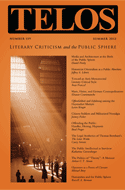Katharina Gerstenberger’s “The Public Intellectual as Survivor: The Cases of Josef Haslinger and Kathrin Röggla” appears in Telos 159 (Summer 2012). Read the full version online at the Telos Online website, or purchase a print copy of the issue here.
 The article contrasts recent works by the Austrian writers Josef Haslinger and Kathrin Röggla, both of whom have made names for themselves as political and cultural commentators, about their respective experiences of the 2004 tsunami in Thailand and the 9/11 attacks in New York City. Titled Phi Phi Island (2007), Haslinger’s narrative is a personal yet highly self-reflective account of his survival. His overarching concern is the coincidence of survival and the challenge this poses to his self-identity as an engaged author who believes his work to be politically meaningful. Röggla, whose life, unlike Haslinger’s, was not in immediate danger, chronicles the unfolding public response to the attacks through comments she collected from a variety of interlocutors in New York City as well as from television. The division between the public and the private, which for Haslinger remains central, becomes obsolete in Röggla’s really ground zero (2001). Her expressed inability to transform her experience into a coherent narrative is symptomatic of her fragmented text. In the end, both authors must acknowledge that surviving a catastrophe is an assault on private as well as public subject positions, forcing them to rethink from where and how cultural critique can be launched.
The article contrasts recent works by the Austrian writers Josef Haslinger and Kathrin Röggla, both of whom have made names for themselves as political and cultural commentators, about their respective experiences of the 2004 tsunami in Thailand and the 9/11 attacks in New York City. Titled Phi Phi Island (2007), Haslinger’s narrative is a personal yet highly self-reflective account of his survival. His overarching concern is the coincidence of survival and the challenge this poses to his self-identity as an engaged author who believes his work to be politically meaningful. Röggla, whose life, unlike Haslinger’s, was not in immediate danger, chronicles the unfolding public response to the attacks through comments she collected from a variety of interlocutors in New York City as well as from television. The division between the public and the private, which for Haslinger remains central, becomes obsolete in Röggla’s really ground zero (2001). Her expressed inability to transform her experience into a coherent narrative is symptomatic of her fragmented text. In the end, both authors must acknowledge that surviving a catastrophe is an assault on private as well as public subject positions, forcing them to rethink from where and how cultural critique can be launched.


